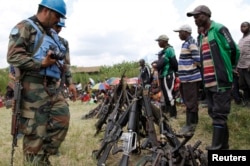The U.N.’s top envoy in the Democratic Republic of Congo said Thursday that if armed groups in the country’s east do not voluntarily disarm, they will face military pressure to do so.
Martin Kobler told the U.N. Security Council that the top priority of the U.N. mission in DRC - known as MONUSCO - is the disarming and demobilization of the Rwandan Hutu rebel group, FDLR.
“To the FDLR - seize this last opportunity and move forward with this process. All combatants, including leaders, must disarm now,” he said.
The FDLR was formed by the leaders of the 1994 Rwandan genocide. Since 2002, more than 11,000 FDLR fighters in DRC have been demobilized, repatriated and reintegrated into Rwandan society. Kobler said the Congolese government estimates about 1,500 combatants and their dependents remain.
“We are now at the endgame. It is time for those 1,500 to stop the fight. It is time for those sought by justice to be put before the appropriate tribunals. It is time for those that can go back to Rwanda to do so,” he said.
In May, the government gave rebels 22 days to voluntarily lay down their weapons and move to two temporary camps from which they would be repatriated or moved to a third country. Kobler said 186 combatants and their dependents took that offer, but since a six-month extension was given in July, the process has stalled.
“The perceived absence of military pressure has thrown the process into the freezer,” he said.
He warned that fighters who fail to disarm could be forced to do so by MONUSCO and the Congolese army.
“I suggest joint military actions against those FDLR factions not willing to disarm and act against those who continue to commit human rights violations.” said Kobler.
U.N. Secretary-General Ban Ki-moon said in a report that some 6,000 armed fighters surrendered to Congolese authorities and MONUSCO since the defeat of M23 rebels in the east last year. Ban called for the quick completion of the disarmament and demobilization of FDLR fighters and noted that ADF-Nalu, a Ugandan Islamist rebel group in the eastern DRC, has been significantly weakened, but not defeated.
Security gains in the past year have led nearly a half million displaced Congolese to return to their homes in the east, but Kobler warned that the situation is still fragile and not irreversible.




